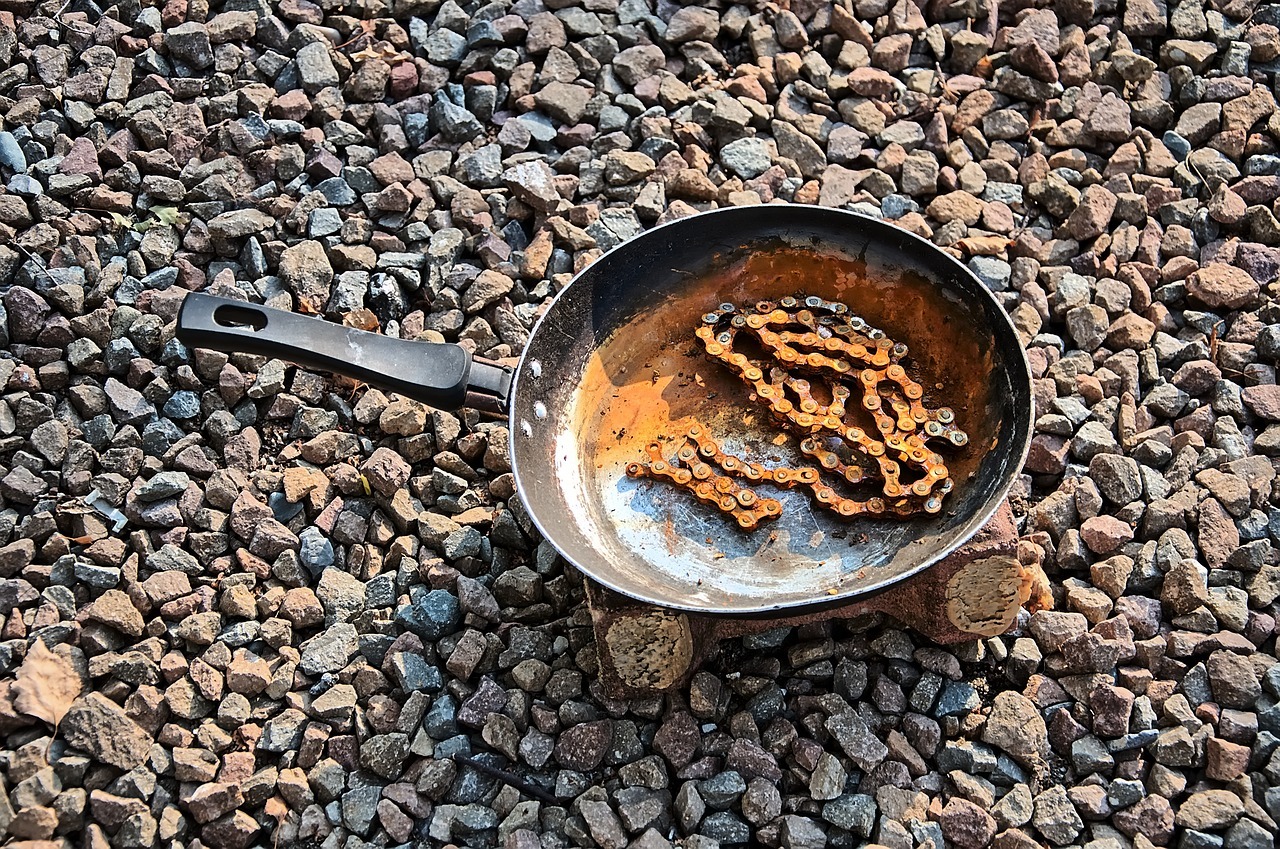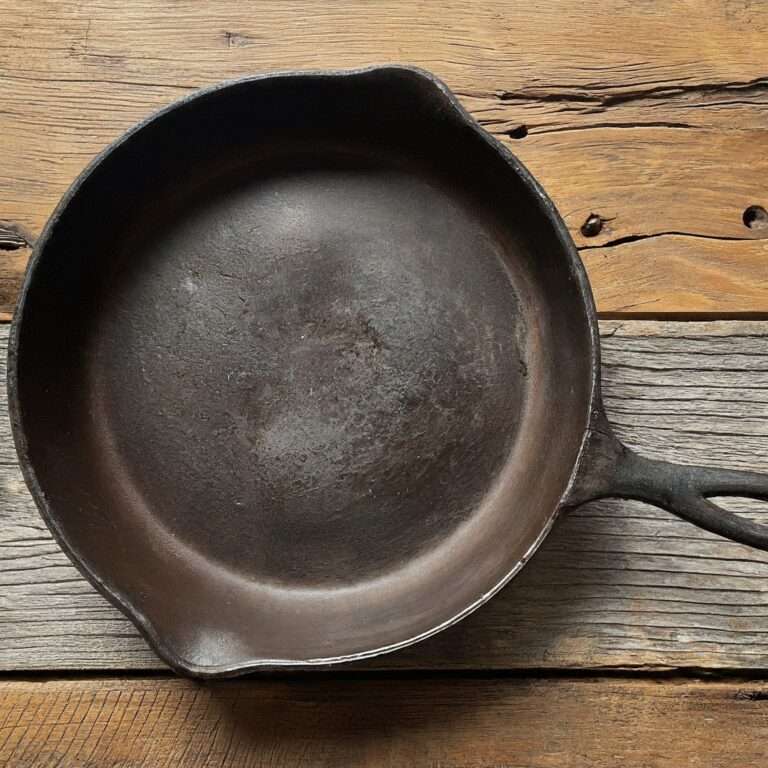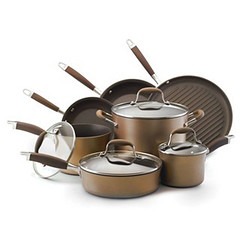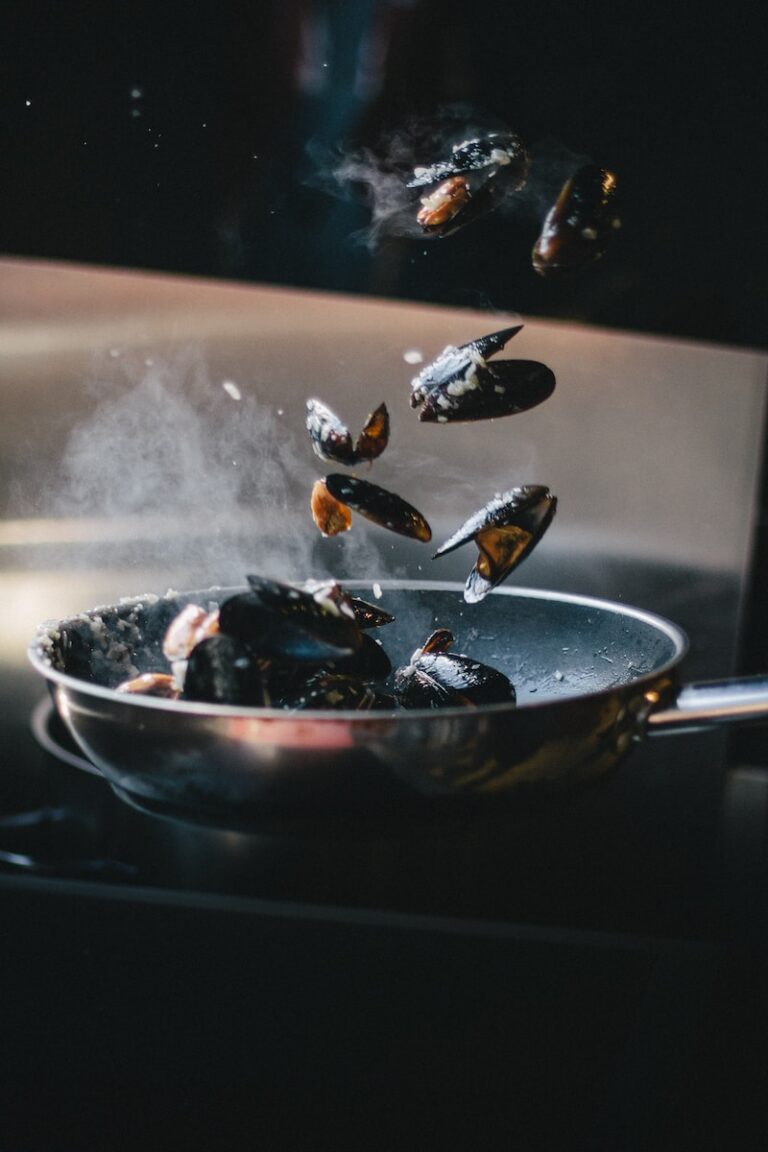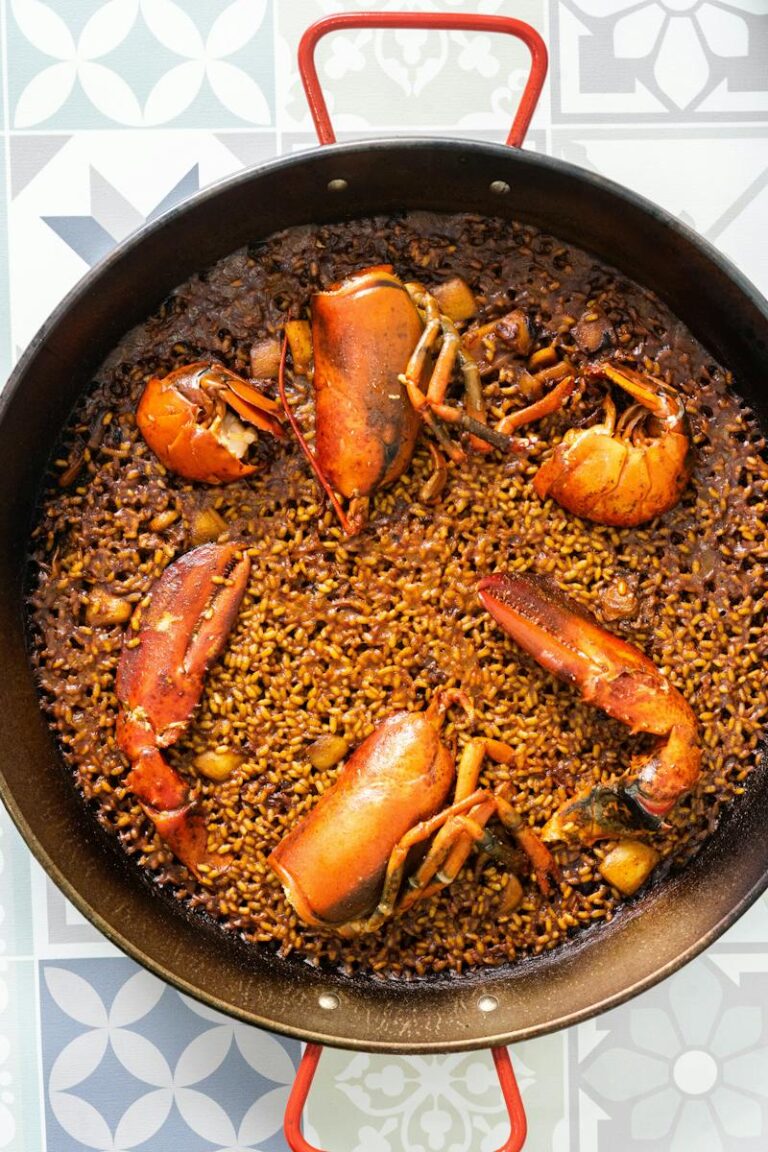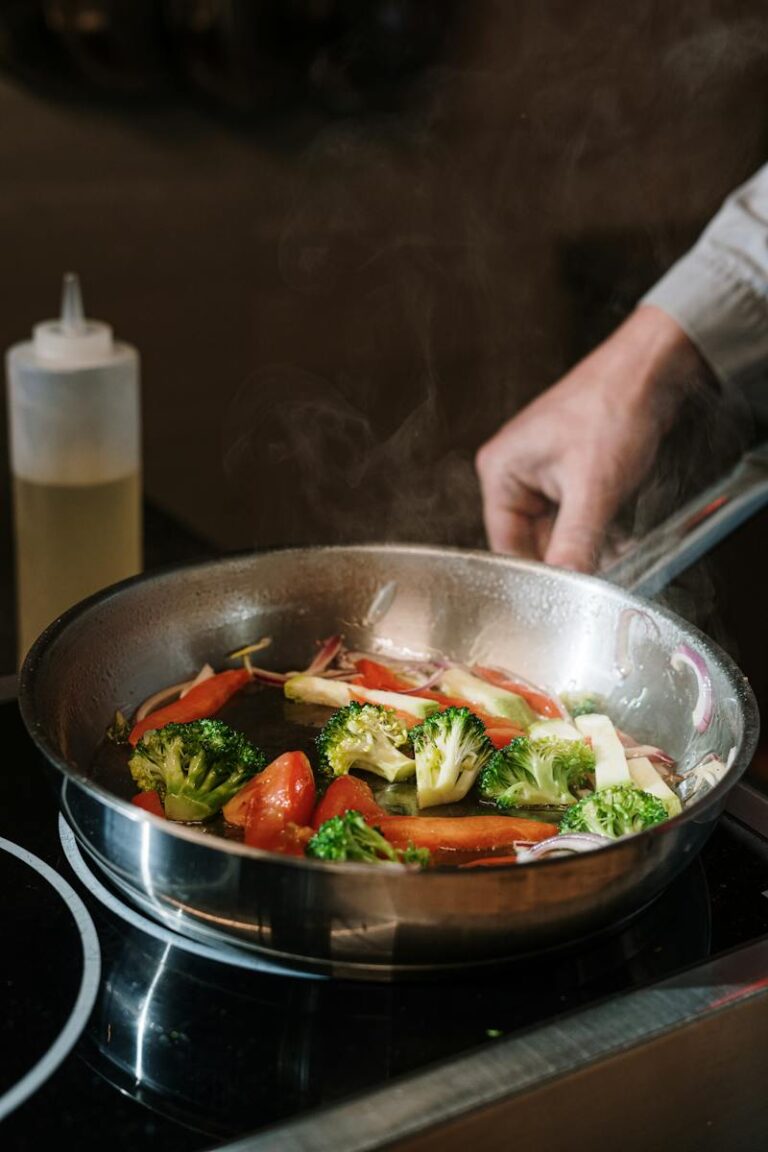Are you worried about the potential health risks of cooking in a rusty pan? Don’t fret, we’ve got you covered.
In this article, we’ll delve into the science behind rusty pans and uncover whether or not they can harm you.
Discover how rust can affect your food, the potential contaminants it may introduce, and the impact on nutritional value.
Plus, we’ll explore alternatives and provide tips for cleaning and restoring rusty pans.
Stay informed and make the right choice for your health.
Key Takeaways
- Rust formation on pans can lead to the transfer of harmful substances and alter the taste, texture, and quality of food.
- Cooking with a rusty pan can pose health risks such as foodborne illnesses, stomach discomfort, and weakened immune system.
- Preventive measures like cleaning, drying, and applying oil can help prevent rust formation and minimize health risks.
- Using alternative pans like stainless steel, cast iron, ceramic-coated, or non-stick pans can be a solution to avoid cooking in a rusty pan and improve overall cooking experience.
The Science Behind Rusty Pans
Using a rusty pan can potentially harm you due to the chemical reactions that occur between the rust and the food. Rust is formed when iron reacts with oxygen and moisture, and when it comes into contact with food, it can lead to the transfer of harmful substances.
To prevent rust from forming on your pans, it’s important to clean and dry them thoroughly after each use. You can also apply a thin coat of oil to create a barrier between the pan and moisture.
Rust not only affects the appearance of your pan, but it can also impact the quality of your food. When rust mixes with food, it can alter the taste and texture, and in some cases, lead to food poisoning.
Understanding the Health Risks
Understanding the health risks associated with using a rusty pan is important for your well-being. Here are some key points to consider:
- Rust can contain harmful bacteria that may cause foodborne illnesses.
- Consuming rust particles can lead to stomach discomfort and digestive issues.
- Cooking with a rusty pan can cause the release of toxic substances into your food.
- Ingesting rust can weaken your immune system and make you more susceptible to infections.
To prevent these health risks, it’s crucial to take proper care of your pans. Seasoning your pan with oil helps create a protective layer that prevents rust from forming. Additionally, using rust prevention methods like drying your pan thoroughly after washing and avoiding leaving acidic foods in the pan for long periods can help maintain its condition and minimize the risk of rust.
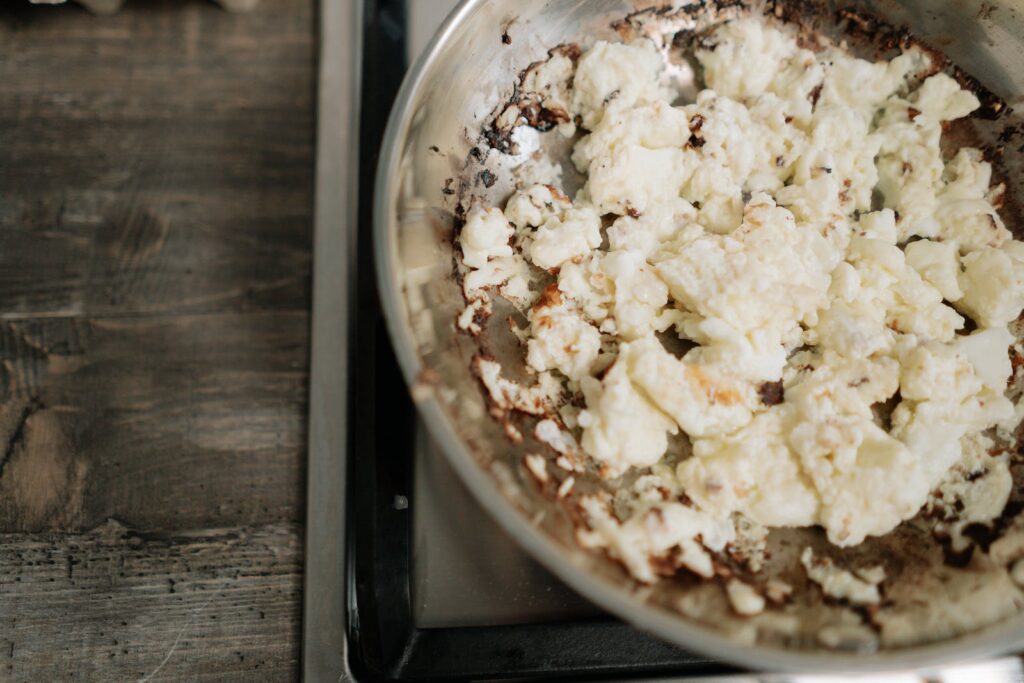
How Rust Can Affect Your Food
To ensure the safety of your meals, it’s important to be aware of how rust can impact the quality and taste of your food.
Cooking in a rusty pan can pose potential dangers and lead to food contamination. When a pan is rusty, it can cause the metal to break down and mix with your food. This can result in a metallic taste and affect the overall flavor.
Additionally, rust can be a breeding ground for bacteria, which can contaminate your food and make you sick. It’s crucial to regularly inspect your pans for any signs of rust and replace them if necessary.
Potential Contaminants in Rusty Pans
When using rusty pans, you should be aware of the potential contaminants that can transfer to your food. Rust particles can flake off the pan and mix with your meal, posing health risks if ingested.
To ensure food safety, it’s important to understand these concerns and take preventive measures to avoid using rusty pans in your cooking.
Health Risks of Rust
Using a rusty pan can increase your risk of health issues. Rusty pans can be dangerous because the rust on the surface can contaminate your food and lead to foodborne illnesses.
Here are some health risks associated with using rusty pans:
- Rust contains iron oxide, which can cause digestive issues and upset stomach when ingested.
- The bacteria that can grow in the rust can cause food poisoning and gastrointestinal infections.
- Rust particles can scratch the non-stick coating of your pan, exposing you to potentially harmful chemicals.
- Inhaling rust particles can irritate your respiratory system and lead to respiratory problems.
To ensure your safety and prevent these health risks, it’s important to regularly inspect your cookware and replace any rusty pans. Remember, a little extra caution can go a long way in protecting your health.
Food Safety Concerns
Inspecting your cookware regularly is essential for ensuring food safety and preventing potential health risks. When it comes to rusty pan maintenance, it’s important to debunk some rust-related myths.
Firstly, many people believe that cooking in a rusty pan can cause health issues. However, this isn’t entirely true. The rusty layer on the pan is simply iron oxide, which isn’t harmful if ingested in small amounts.
That being said, it’s still important to address the issue of rust in your cookware. Rust can affect the taste and appearance of your food, and it can also contaminate it with bacteria. Therefore, it’s recommended to clean and season your rusty pans regularly to prevent further rusting and to ensure food safety.
Rust Prevention Methods
To prevent rust on your pans, it’s important to properly dry them after washing. Here are some rust prevention techniques and the importance of regular maintenance:
- Dry thoroughly: After washing, use a clean towel to dry your pans completely. Moisture is a major contributor to rust formation.
- Season your pans: Applying a thin layer of oil and baking it in the oven helps create a protective barrier against rust.
- Store properly: Keep your pans in a dry place, away from humidity and moisture. Consider using pan protectors to prevent scratching and rusting.
- Regularly inspect and clean: Check your pans for any signs of rust or damage. If you notice any, use a scrub brush or steel wool to remove the rust and reseason the pan if necessary.
The Impact on Nutritional Value
When cooking in a rusty pan, you may be compromising the nutritional value of your food. Rust can cause the leaching of minerals like iron into your food, which can be harmful in excessive amounts.
Additionally, the formation of rust can indicate a degraded cooking surface, making it harder for your food to absorb nutrients properly.
Nutrient Loss in Rust
Using a rusty pan can cause nutrient loss in your food. When you cook with a rusty pan, it can lead to a decrease in the nutritional content of your meals. Here’s why:
- Rust can react with acidic foods, causing the release of iron particles into your food.
- The presence of rust can alter the taste and color of your dishes.
- Rusty pans may have uneven heat distribution, resulting in uneven cooking.
- The deterioration of the pan’s surface can make it harder to clean and maintain.
To prevent nutrient loss and maintain a healthy cooking environment, it’s important to take care of your pans. Regularly clean and dry them thoroughly, and avoid using abrasive materials that can strip away the protective coating.
Health Risks Associated?
Now that we’ve discussed the nutrient loss in rusty pans, let’s dive into the health risks associated with using them. Cooking in a rusty pan can pose various dangers to your well-being. The rust itself can contain harmful substances like iron oxide, which, when ingested, may lead to gastrointestinal issues. Additionally, the flakes of rust can mix with your food, increasing the risk of consuming metal particles that can cause damage to your organs over time.
To help you understand the potential health risks better, here’s a table outlining some of the most common problems associated with cooking in rusty pans and the prevention methods you can implement:
| Health Risks | Prevention Methods |
|---|---|
| Gastrointestinal issues | Regularly inspect and clean your pans to prevent rust buildup |
| Ingestion of metal particles | Avoid using rusty pans, opt for non-rusty alternatives |
| Organ damage over time | Replace rusty pans with new ones to ensure your safety |
Rusty Pans and Food Safety Guidelines
You should be aware that cooking in a rusty pan can potentially harm your health. Rust is a sign of corrosion, and when it comes into contact with your food, it can introduce harmful substances into your meals. To prevent any health risks, here are some guidelines for rusty pan cleaning and maintenance:
- Clean the pan thoroughly: Use warm soapy water and a scrub brush to remove any rust or residue.
- Season the pan: After cleaning, apply a thin layer of oil to the pan to prevent further rusting.
- Avoid acidic foods: Acidic ingredients like tomatoes or citrus can react with the rust and cause it to leach into the food.
- Store properly: Keep your pans dry and store them in a cool, dry place to prevent rust formation.
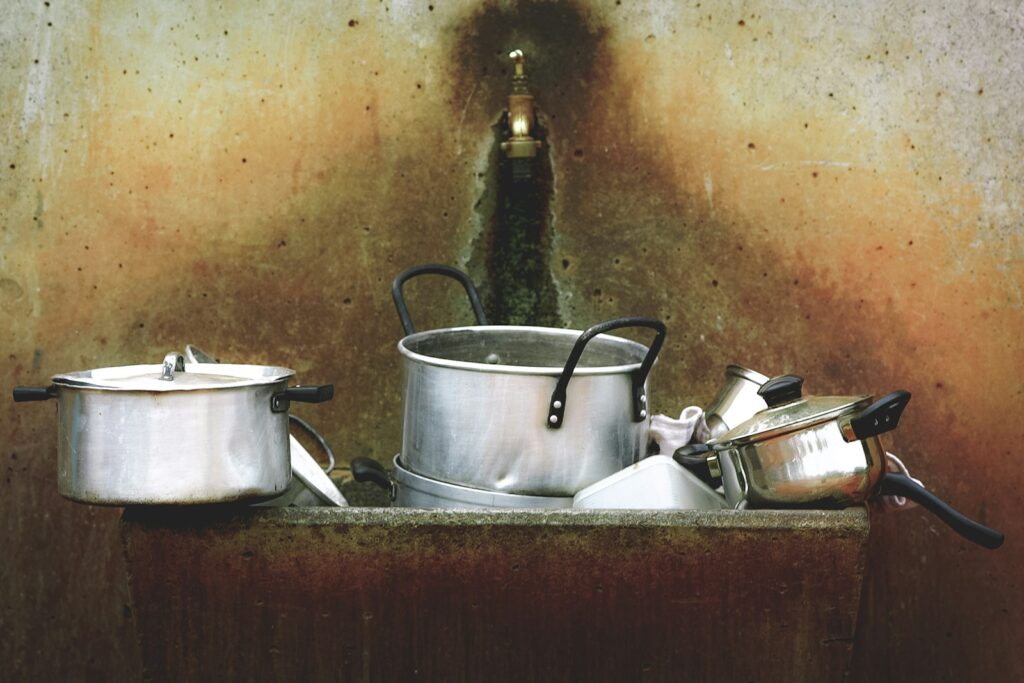
Tips for Properly Maintaining Your Pans
To keep your pans in good condition, it’s important to regularly clean and season them. Not only will this help maintain their quality, but it will also prevent rust from forming. Rust can not only damage your pans but also affect the taste and safety of your food. To prevent rust, make sure to dry your pans completely after washing them. Additionally, you can use rust prevention techniques such as applying a thin layer of oil or using a rust-resistant coating. When it comes to cleaning your pans, avoid using harsh abrasives that can scratch the surface. Instead, opt for gentle cleaning methods like using warm soapy water and a non-abrasive sponge. By following these proper cleaning methods and rust prevention techniques, you can ensure that your pans stay in great shape for years to come.
| Rust Prevention Techniques | Proper Cleaning Methods |
|---|---|
| Apply a thin layer of oil | Use warm soapy water |
| Use a rust-resistant coating | Use a non-abrasive sponge |
| Dry pans completely after washing | Avoid harsh abrasives |
| Regularly clean and season pans |
Common Myths and Misconceptions
You may have heard some common myths and misconceptions about cooking with rusty pans, but it’s time to set the record straight.
Contrary to popular belief, using a rusty pan won’t directly harm your health. While it may not be visually appealing, consuming small amounts of rust is generally safe for most people.
Rusty Pan Health Risks
Using a rusty pan can potentially harm your health. It’s important to understand the risks associated with cooking in a rusty pan and take necessary precautions to ensure your safety. Here are a few key points to keep in mind:
- Rusty pan maintenance: Regularly inspect your pans for signs of rust and address any issues promptly. Clean and dry your pans thoroughly after each use to prevent rust formation.
- Rust and cooking safety: Rust can contaminate your food, leading to potential health hazards. Ingesting rust particles can cause stomach discomfort, nausea, and other digestive issues.
- Potential chemical reactions: Cooking acidic foods in a rusty pan can cause the rust to react with the ingredients, altering the taste and potentially releasing harmful chemicals into your food.
- Long-term effects: Continuous exposure to rust can have cumulative effects on your health. It’s essential to prioritize using clean and well-maintained cookware to minimize any risks.
Effects of Rust Consumption
Consuming rust can potentially lead to various health issues, such as stomach discomfort and digestive problems. When you ingest rust, it can irritate your stomach lining, causing discomfort and potentially leading to more serious digestive issues. The effects of rust consumption can range from mild discomfort to more severe symptoms, depending on the amount ingested and individual susceptibility.
It’s important to take preventive measures to avoid consuming rust. One effective prevention method is to regularly inspect and clean your cookware, especially if it’s made of materials that are prone to rusting. Additionally, using non-abrasive cleaning tools and avoiding harsh chemicals can help prolong the lifespan of your cookware and reduce the risk of rust formation.
Remember to prioritize your health and take steps to prevent the harmful effects of rust consumption.
Alternatives to Rusty Pans
If your pan is rusty, it’s time to consider other options. Using a non-rusty pan has several benefits that you may not be aware of.
Here are some alternatives to rusty pans that you can try:
- Stainless steel pans: These are durable and resistant to rust, making them a great choice for cooking.
- Cast iron pans: They’re known for their excellent heat retention and distribution, ensuring even cooking.
- Ceramic-coated pans: These offer a non-stick surface without the need for excessive oil or butter.
- Non-stick pans: Made with a special coating, they prevent food from sticking and are easy to clean.
Using non-rusty pans not only ensures that your food is safe but also allows for better cooking results. Say goodbye to the worries of consuming rust and enjoy the benefits of cooking with non-rusty pans.
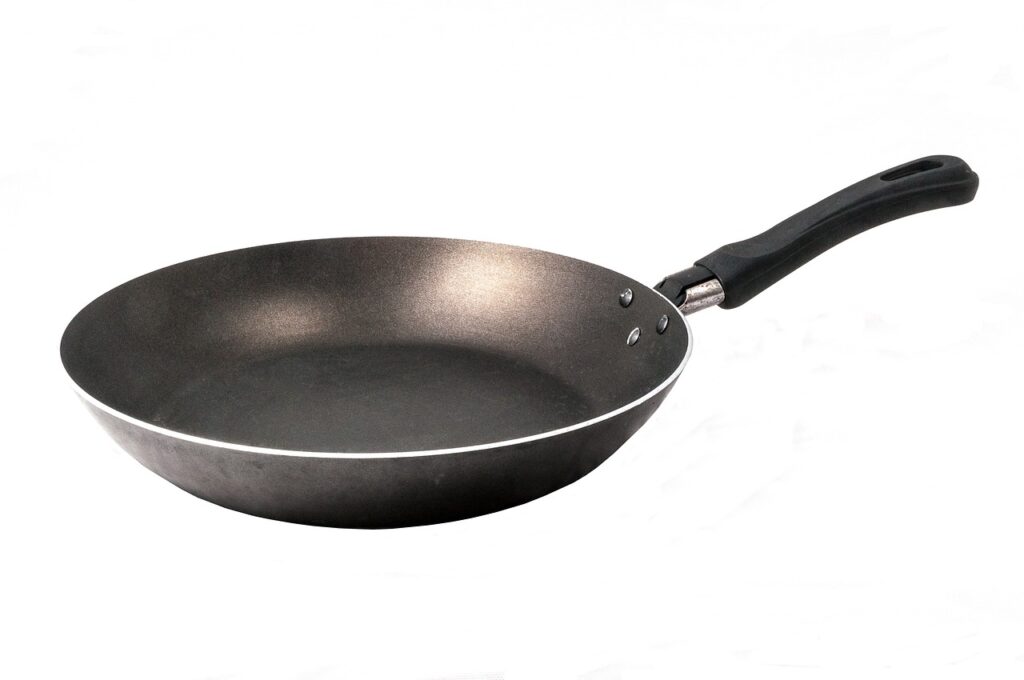
Assessing the Damage: When to Replace a Pan
So, you’ve been using your trusty old pan for years, but now you’re starting to notice some wear and tear. It’s time to assess the damage and decide whether it’s time for a replacement.
When it comes to assessing the need for a new pan, there are a few key factors to consider. First, take a close look at the condition of the pan. Is it heavily scratched, warped, or rusted? These signs of damage can affect the quality of your cooking and potentially have health implications. Rust, in particular, can contaminate your food and may lead to health issues.
Additionally, consider how often you use the pan and how important it’s to your cooking routine. If it’s a pan you use frequently and heavily rely on, it may be worth investing in a new one to ensure the best cooking experience and protect your health.
Cleaning and Restoring Rusty Pans
Have you tried using vinegar and baking soda to remove rust from your old pan? Cleaning and restoring rusty pans can be a simple and effective process, and there are many natural remedies you can try.
Here are some cleaning methods and natural remedies to help you restore your rusty pan:
- Vinegar and baking soda: Create a paste using equal parts vinegar and baking soda. Apply it to the rusty areas and let it sit for a few hours before scrubbing it off.
- Lemon and salt: Cut a lemon in half and sprinkle salt on the cut side. Rub it on the rusted areas until the rust starts to come off.
- Coca-Cola: Soak your rusty pan in Coca-Cola overnight. The acid in the soda can help dissolve the rust.
- Potato and dish soap: Cut a potato in half and dip it in dish soap. Scrub the rusted areas with the potato, as the oxalic acid in potatoes can help remove rust.
With these natural remedies, you can easily clean and restore your rusty pan without the use of harsh chemicals.
Final Verdict: Is Cooking in a Rusty Pan Safe?
Using a rusty pan for cooking can potentially pose health risks due to the potential transfer of rust particles to your food. It’s important to prioritize food safety when preparing meals. Rust particles can contaminate your food, leading to potential health issues if consumed.
To ensure your safety, it’s crucial to take steps for rust prevention. Keep your pans dry and store them in a cool, dry place to prevent rust formation. Additionally, regularly clean and season your pans to maintain their integrity and prevent rust from forming.
If you notice any signs of rust on your pan, it’s best to replace it to avoid any potential health risks. Prioritizing food safety and practicing rust prevention will help ensure that your meals aren’t only delicious but also safe to consume.
Conclusion
In conclusion, cooking in a rusty pan can pose health risks and affect the quality of your food. Rust can introduce potential contaminants and compromise the nutritional value of your meals.
It’s important to assess the damage and consider alternatives to rusty pans. Cleaning and restoring rusty pans can be an option, but if the damage is severe, it may be best to replace the pan altogether.
Ultimately, it isn’t safe to cook in a rusty pan.
